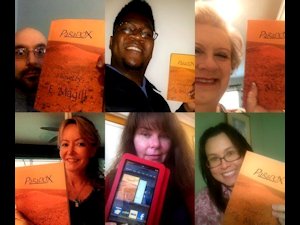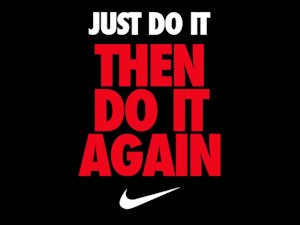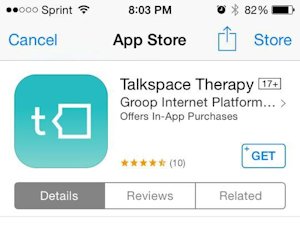15 Things I Learned in 2015
This is the one time of the year I allow myself to be completely self-indulgent here on my website, so be prepared to hear a lot about me today. If you don't know me, maybe you could read this and get to know me a little, and then when you invite yourself over to play Mario Kart, it won't be so weird. 15 nicely divides into three, so for this entry, I've decided to split up my thoughts into three sections: my writing, cooking, and then everything else. I feel I covered my thoughts on 2015 in politics pretty well in my Top 5 Heroes & Idiots of 2015 blog last week, so I managed to find 15 lessons this time around that have nothing to do with any of that madness. First up is my writing, for which 2015 was very important.
More People Like Paradox than I Expected
 | | These beautiful people know what's up |
By far the biggest moment in my career as a writer was 2014's publication of Paradox, a breath-taking science-fiction epic about Mars, Europa, interplanetary war, the possibility of extraterrestrial life, and time travel. It's available through Amazon.com in paperback or on Kindle! I knew I'd get a handful of friends and family to buy it, but without any real budget for publicity, I didn't expect it to get much further than that. For those first two months, though, I sold a copy to virtually everybody I knew (and a few I didn't), and have gotten positive feedback from places I wouldn't have expected. Sure, my geeky friends were shoe-ins who I knew would be down for some hardcore sci-fi craziness, but I wasn't expecting people like my aunt or my grandfather to really like it. I guess you just never know.
Self-Promotion is Hard and Expensive
 | | I did a lot of Facebook marketing and timed sales |
I won't lie, though. I think I've sold a mere hundred copies, and that has been a major blow to my ego. I know that this has little, if anything, to do with the quality of the work. Books that are total garbage can sell millions, and works of extraordinary genius can be lost and forgotten in a heartbeat. I'm no judge of the quality of my own novel--in fact, I'm probably my own worst critic--but I do know that the only reason my book hasn't sold any better than it has is because I haven't been able to advertise it much. I learned long ago that, if you want to even have a snowball's chance in Hell of being a successful novelist, you need a publicist. I have a small but loyal fanbase, but I don't have the kind of resources necessary to broadcast the existence of my novel to the whole world. Last I checked, it doesn't even come up on the first page of results if you type "Paradox" into the Amazon search box.
It would be easy for me to conclude that the system is unfair and rigged against the little guy--and yeah, it is, at least to some extent--but I understand it better than that. Every single book being self-published out there can't be on nightstands around the country. Indeed, most self-published books, I'm sorry to say, are crap, which is why I was reluctant to go this route in the first place. But I'm in this for the long haul, and I'm definitely not doing it to make money. In theory, if I get a hundred people to read Paradox, it'll be easier to get two hundred people to read my next book, and then four hundred after that. And if I happen to save and pinch enough, maybe one day I can afford a publicist for whatever book I'll be writing in ten or twenty years, which will no doubt be even better than anything I've yet written.
Other Writers Will Help
 | | All metaphors are better with monkeys |
A strange phenomenon I didn't foresee was the fact that other self-published writers contacted me almost immediately after I published Paradox, and they cut me a simple deal: I read their book and put up a review, and they'll read mine and put up a review. For people who put their work on places like Amazon, a good review is worth more than any ad, and so it's a logical way for struggling writers to help one another. (By the way, if you've read Paradox, LEAVE A REVIEW! Um, please?) This worked out well. In addition to the reviews, I got to read some other works I wouldn't have otherwise been able to find, much less read, and they got lengthy reviews that I felt were fair. You'd better believe that, when I'm gearing up to publish my next book, I'll start contacting other self-published authors out there with the same deal. Helping each other out is just awesome.
The Pressure to Publish Again is Intense
 | | And again |
And like a drug addict after his first taste of some primo new stuff, I'm dying to do it again. Really. Just dying. I have other manuscripts practically ready to go, but they need to be edited by a third party, and they've been sitting around long enough that I wouldn't feel right publishing them without doing some serious work on them first. Instead of doing that, though, I'm busy working on a brand-new novel that I think will be even better, and I don't really have a choice about that. I wish I could publish a book every year, but that's just not logistically possible at this point in my life. Hopefully this is something I'll be able to figure out as time goes on, but for now, just know I feel physical pain over the fact that I haven't published a second novel yet.
I Can Predict the Future
 | | I didn't predict you could do therapy over the phone without speaking, of course |
For a speculative sci-fi writer who dabbles in futurism, it's satisfying when a prediction about technology or the future ultimately comes true. When I wrote Thesea fourteen years ago, I researched a lot of futuristic technologies, fringe psychology, and transhumanistic philosophy, all of which I used as tools when crafting the main story. Some of that still holds up and I wouldn't change them much if I were to rewrite the novel today (it's on my to-do list), but one thing I am not ashamed to say I completely made up has made its way to the real world.
The heroine of Thesea, Eve Pratchett, is a down-on-her-luck psychologist who has turned to a cheap form of therapy where she communicates with clients over the Internet via text and never actually interacts with them in person. I saw this as an inevitable result of the direction both popular psychology and the Internet were going, and lo and behold, it turns out I predicted the existence of companies like Talkspace and Breakthrough, businesses specializing in "online therapy" that allow you to chat with professional psychologists via text over the Internet. Online therapy has been around in some form or another for a couple of years, but the point is, I was at least a decade ahead of the game. I've learned I need to be less than humble about my writing if I want attention, so here's me bragging about it. I wonder what else I've gotten right... (DISCLAIMER: Be careful if you are thinking of doing some online therapy, because there are a few scams out there just trolling for personal information.)
-e. magill 1/13/2016
|
|